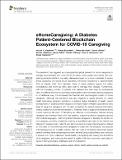| dc.contributor.author | Alsalamah, Hessah A. | |
| dc.contributor.author | Alsuwailem, Ghada | |
| dc.contributor.author | Bin Rajeh, Fatima | |
| dc.contributor.author | Alharbi, Samar | |
| dc.contributor.author | AlQahtani, Salmah | |
| dc.contributor.author | AlArifi, Razan | |
| dc.contributor.author | AlShargi, Shaden | |
| dc.contributor.author | Alsalamah, Sara A. | |
| dc.contributor.author | Alsalamah, Shada | |
| dc.date.accessioned | 2021-10-07T20:42:09Z | |
| dc.date.available | 2021-10-07T20:42:09Z | |
| dc.date.issued | 2021-06-30 | |
| dc.identifier.issn | 2624-7852 | |
| dc.identifier.issn | 2624-7852 | |
| dc.identifier.uri | https://hdl.handle.net/1721.1/132790 | |
| dc.description.abstract | The pandemic has triggered an unprecedented global demand for home caregiving to manage asymptomatic and mild COVID-19 cases. Older people and others with pre-existing medical conditions (including diabetes) appear to be more vulnerable to severe illness caused by the severe acute respiratory syndrome coronavirus 2. Approximately 25% of Saudis suffer from diabetes; these 4 million patients require 5.5 million consultations and follow-up visits each year to manage their disease. Furthermore, with the increasing number of patients with diabetes and their need for professional care, it is difficult and time consuming to share patient-care information among caregivers in a traditional way; this increases the financial and psychological burden of home caregivers. Although the pandemic has also triggered a global demand for digital health technology adoption worldwide to achieve higher standards of health, recent developments in advanced technologies and mobile health (mHealth) applications have failed to equip the caregivers with the right ecosystem for patient-centered information sharing to allow for informed care decisions. Therefore, there is a gap in the literature as the current solutions fall short of facilitating an effective communication channel among caregivers and between them and their patients, supporting diverse caregiving groups with multiple languages, distributing tasks between caregivers to alleviate the burden on one caregiver, providing a treatment plan by a specialized care team to be viewed and followed by caregivers and patients, and alerting everyone in case of an emergency. Based on the need for empowering home caregivers to cope with the pressure, we propose eHomeCaregiving, an mHealth solution that can build a transparent blockchain-based patient-centered family caregiving ecosystem. eHomeCaregiving facilitates care continuity in patients with type 2 diabetes in Saudi Arabia by integrating care, saving time and efforts of all caregivers, and improving the patient’s quality of life and outcomes, particularly in terms of facing emerging challenges amid the pandemic. | en_US |
| dc.publisher | Frontiers Media SA | en_US |
| dc.relation.isversionof | 10.3389/fbloc.2021.477012 | en_US |
| dc.rights | Creative Commons Attribution 4.0 International license | en_US |
| dc.rights.uri | https://creativecommons.org/licenses/by/4.0/ | en_US |
| dc.source | Frontiers | en_US |
| dc.title | eHomeCaregiving: A Diabetes Patient-Centered Blockchain Ecosystem for COVID-19 Caregiving | en_US |
| dc.type | Article | en_US |
| dc.identifier.citation | Alsalamah, Hessah A., Alsuwailem, Ghada, Bin Rajeh, Fatima, Alharbi, Samar, AlQahtani, Salmah et al. 2021. "eHomeCaregiving: A Diabetes Patient-Centered Blockchain Ecosystem for COVID-19 Caregiving." 4. | |
| dc.contributor.department | Program in Media Arts and Sciences (Massachusetts Institute of Technology) | |
| dc.eprint.version | Final published version | en_US |
| dc.type.uri | http://purl.org/eprint/type/JournalArticle | en_US |
| eprint.status | http://purl.org/eprint/status/PeerReviewed | en_US |
| dspace.date.submission | 2021-10-07T18:24:54Z | |
| mit.journal.volume | 4 | en_US |
| mit.license | PUBLISHER_CC | |
| mit.metadata.status | Authority Work Needed | en_US |
